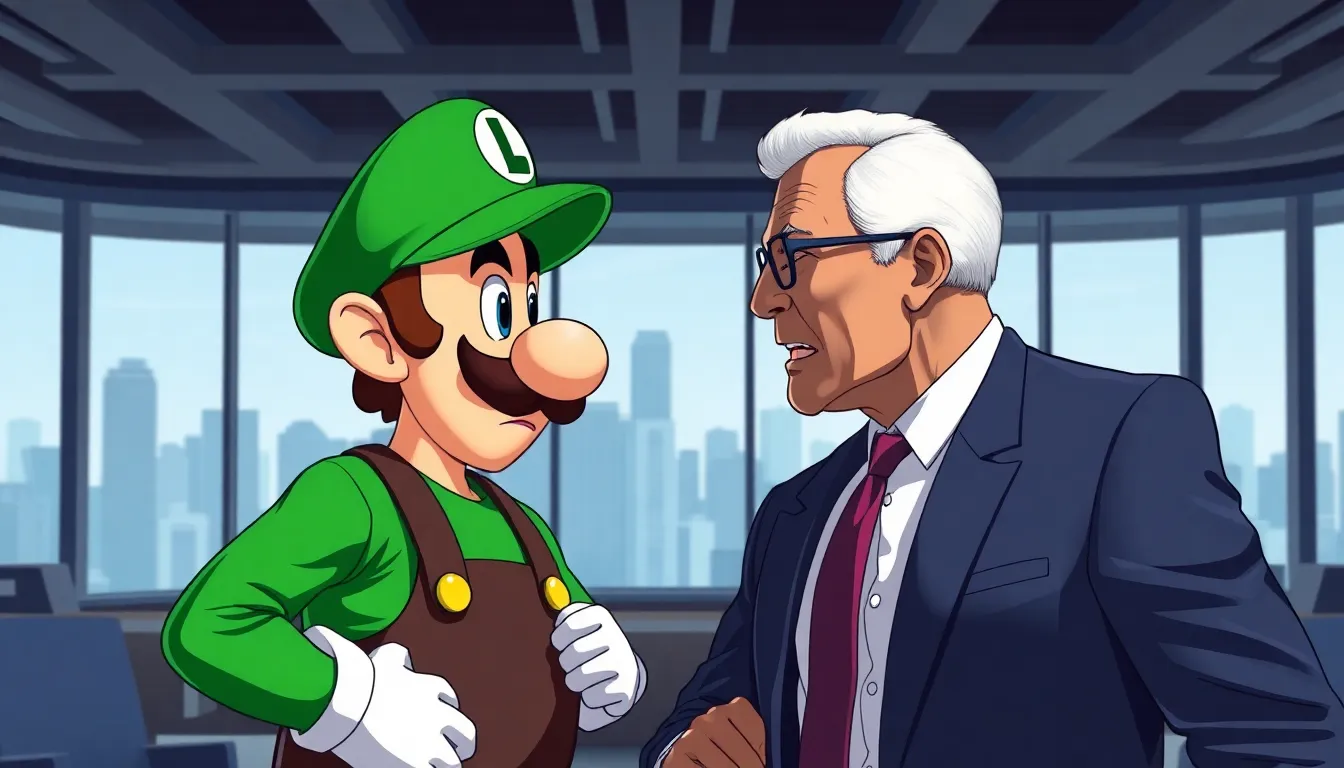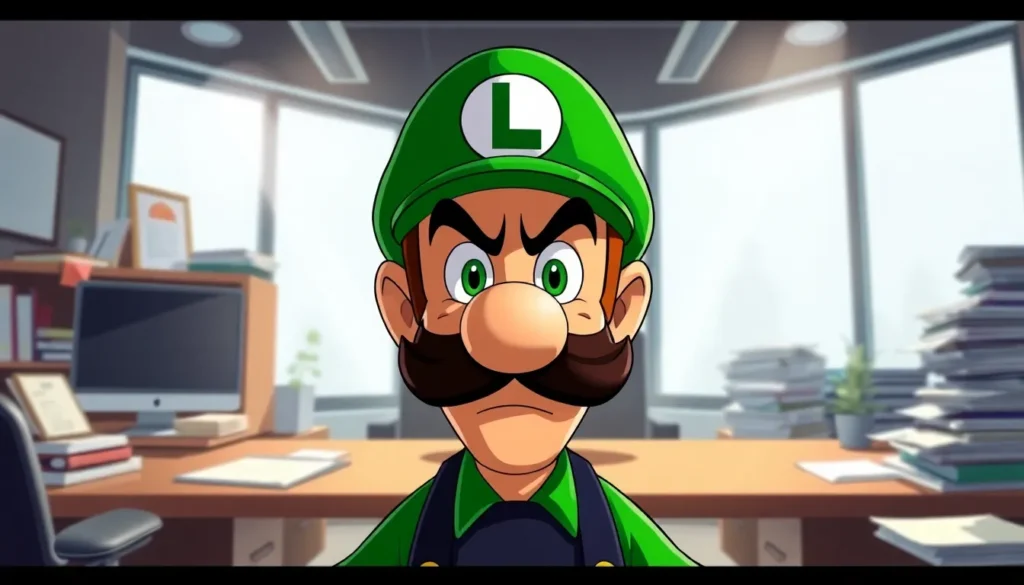Table of Contents
ToggleIn a world where video game characters often blur the lines between hero and villain, one question stands out: Why did Luigi kill the CEO? It sounds like the plot twist of a bizarre indie game, but this scenario has captivated fans and sparked countless theories. Luigi, the lovable green-clad brother, known for his jumps and ghost-busting antics, suddenly becomes a figure of intrigue and chaos.
Was it a case of mistaken identity or a corporate conspiracy gone horribly wrong? Maybe Luigi just wanted to level up his career. As the story unfolds, it invites a mix of humor and suspense, making it a perfect topic for discussion. Buckle up as we dive into the whimsical yet dark realm of video game narratives and explore the motives behind this shocking act.
Background of the Incident
This incident centers around Luigi, a prominent figure in the gaming world, who allegedly killed a CEO. The circumstances leading to this event involve rising tensions within a corporation known for its innovative gaming strategies. Gamers speculate that intense competition fueled Luigi’s actions.
Rumors suggest a vast conspiracy underlying the CEO’s controversial business practices. Employees reportedly voiced concerns about unethical decisions, further escalating workplace drama. Following a series of corporate betrayals, Luigi might have felt cornered, leading to impulsive actions.
Numerous narratives circulate about a potential identity mix-up. One theory claims Luigi was misinformed about his target, believing he was confronting a rival. This miscommunication creates an even more tangled web of motives. In the gaming community, the implications of such an event stir conversations about ethics in competition.
Various theories emerge about Luigi’s potential alliances. Some speculate he sought revenge for an unfair dismissal. Others propose career ambitions drove him toward this drastic measure. Each theory reflects broader themes of loss and ambition prevalent in gaming narratives.
Recent reports reveal increasing interest among fans to discuss character development. They question how far someone like Luigi would go when faced with betrayal. This incident prompts reevaluations of heroism and morality in video game storylines.
The Characters Involved

This incident features significant characters impacting the events. Both Luigi and the CEO play pivotal roles in the unfolding drama.
Overview of Luigi
Luigi serves as a prominent character in the gaming universe. He often embodies the player’s journeys through challenges. His persona reflects bravery, but he also faces personal fears and insecurities. Known for his green outfit and accent, Luigi often balances his brother Mario’s popularity. His cheerful demeanor can hide deeper emotions. Driven by loyalty to friends and family, he often finds himself caught in chaotic situations. The notion of mistaken identity emerges as a possible catalyst for his actions. Engaging with various gameplay scenarios, he collects items, battles enemies, and navigates dilemmas. This character depth adds intrigue to his motivations in this incident.
Profile of the CEO
The CEO represents corporate authority and innovation in the gaming industry. Known for ambitious strategies, this leader influences company culture. Employees express mixed feelings about the CEO’s controversial decisions. Conversations often center around ethics due to risky business practices. Critics suggest the CEO prioritizes profits over employee well-being. Conflicting visions for the company fuel tension in the workplace. Those within the organization take note of the CEO’s aggressive competitive tactics. This tension hints at an underlying conflict leading to Luigi’s drastic actions. Speculation about the CEO’s role in corporate conspiracies broadens the narrative surrounding this incident.
The Motive Behind the Act
Multiple factors contributed to Luigi’s drastic decision to kill the CEO, intertwining financial and personal dynamics.
Financial Incentives
Luigi faced immense pressure from a competitive market atmosphere. Detailed reports suggest the corporation prioritized profit margins over employee satisfaction. In light of this, Luigi felt undervalued despite his contributions. Competing interests within the organization heightened stress levels among employees. Speculation surrounds the potential financial rewards of aligning with rival companies, enticing Luigi to consider extreme measures. The allure of financial gain often motivates drastic actions, especially in a cutthroat environment. He might’ve perceived the CEO’s aggressive tactics as a direct threat to his financial stability. Such motivations underscore how the industry’s ruthless competition drove him toward a desperate act.
Personal Grievances
Luigi’s personal grievances played a significant role in fueling the incident. Recent layoffs troubled him, leading to feelings of betrayal and anger. Many employees noted that the CEO’s decisions frequently disregarded worker well-being. Luigi’s connections with former colleagues created a sense of loyalty and camaraderie, which the CEO undermined. Incidents of miscommunication within the hierarchy contributed to growing frustration. Threats to job security exacerbated Luigi’s resentment, pushing him closer to impulsive actions. The cumulative weight of these grievances may have positioned Luigi as a reluctant catalyst in this dark narrative. Each personal factor aligned to reshape his view of justice and empowerment.
The Aftermath of the Incident
Public reactions to the incident paint a vivid picture of confusion and outrage. Fans quickly took to social media platforms, voicing their disbelief over Luigi’s alleged actions. They expressed anger, humor, and bewilderment, leading to viral memes and discussions around ethics in gaming. Debates ignited about loyalty, ambition, and the pressures within corporate structures. Many supporters of Luigi attempted to contextualize his behavior, suggesting systemic issues in the company drove him to this extreme reaction. Others firmly rejected any justification, arguing that violent actions cannot align with a hero’s journey, regardless of circumstances.
Legal consequences followed swiftly, raising questions about accountability and corporate liability. Authorities opened investigations, focusing on potential charges against Luigi and examining the corporation’s role in fostering a toxic environment. The aftermath led to wider discussions about employee rights and corporate governance. Legal experts highlighted the possibility of wrongful termination claims from employees affected by layoffs, complicating the situation further. Furthermore, discussions emerged surrounding the liability of corporate leaders when workplace cultures become hostile. The incident urged better policies to protect employee welfare and ensure safety within the workplace.
The shocking incident involving Luigi and the CEO has ignited a whirlwind of discussions within the gaming community. It highlights the complexities of character motivations and the darker narratives that can emerge in video games. As fans dissect the layers of betrayal ambition and ethical dilemmas they’re prompted to reflect on the implications of corporate culture on individual actions.
This narrative serves as a reminder of how deeply intertwined personal and professional struggles can lead to unexpected outcomes. The conversations surrounding Luigi’s actions continue to evolve urging a deeper examination of heroism morality and the pressures faced in competitive environments. Ultimately this incident not only challenges perceptions of beloved characters but also calls for a critical look at workplace dynamics and accountability in the gaming industry.







